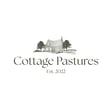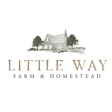
Raw Milk, Community and "Striving to be a Good Shepherd" with Glastonbury Farm
On this interview I had the privilege of interviewing Curtis and Rose Weisenburger of Glastonbury Farm. We spoke about raw milk, the story behind the name Glastonbury and more. Near the end of the episode we addressed a blog post written by Rose titled, "Striving to Be a Good Shepherd." I was really impressed when reading this post and want to encourage you to read the post too.
Read "Striving to Be a Good Shepherd" by Rose Weisenburger
Check out Glastonbury Farm!
Do you have a great homesteading story to share? Send us an email at hello@littlewayhomestead.com. Let us know!
We are also looking for contributors to our website blog. If you are interested in having a homesteading, small-scale farming, or Catholic faith themed post included in the blog - send us submissions directly at hello@littlewayhomestead.com
Are you a Catholic farming, homesteading or otherwise producing an agricultural good (e.g., beeswax candles, etc.)? Consider listing your business on the Little Way Farm and Homestead website. There is no charge at this time to do so. Visit www.littlewayhomestead.com/directory
For more information about Little Way Farm and Homestead [https://www.littlewayhomestead.com]including the farm, podcast, and upcoming events, check out https://littlewayhomestead.com/.
For media inquiries, advertising, speaking requests, guest referrals, consulting and more - email us at hello@littlewayhomestead.com.

